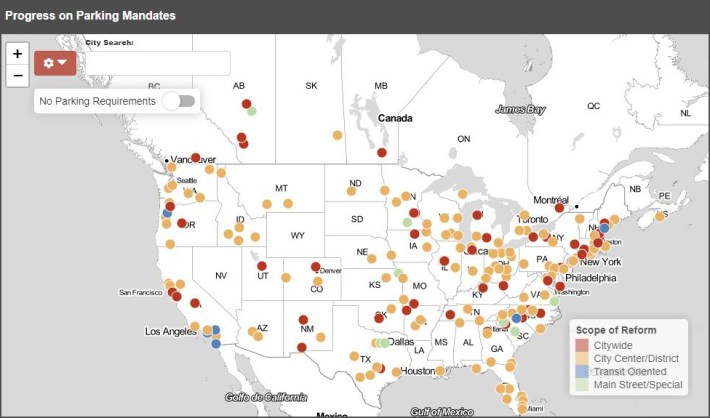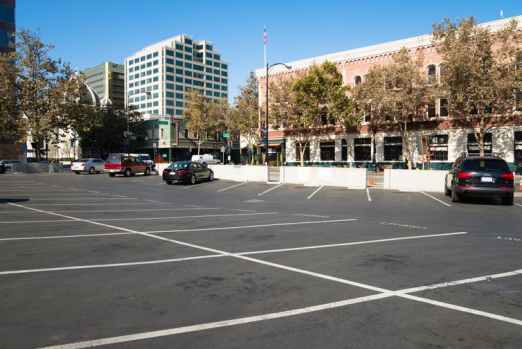Was 2021 the year that U.S. planners finally lost faith in minimum parking requirements?
It certainly seems so. With remarkable speed, governments across America are adopting three reforms recommended by UCLA Distinguished Research Professor and internationally recognized parking expert Donald Shoup:
- Remove off-street parking requirements. Developers and businesses can then decide how many parking spaces to provide for their customers.
- Charge the right prices for on-street parking. The right prices are the lowest prices that will leave one or two open spaces on each block, so there will be no parking shortages.
- Spend the parking revenue to improve public services on the metered streets. If everybody sees their meter money at work, the new public services can make demand-based prices for on-street parking politically popular.

Those reforms seemed radical when I began my career as a transportation planner. Now, they’re becoming commonplace:
- In January, South Bend, Ind. removed minimum parking requirements citywide.
- Days later, the City Council of Sacramento voted unanimously to eliminate the city’s remaining minimum parking requirements. Minimum parking requirements have been losing support in Sacramento since at least 2011, when a study found that the Central City had more than 45,000 vacant parking spaces at the hour of peak demand.
- Berkeley’s City Council voted to remove minimum parking mandates for all residential uses, except for two hillside neighborhoods that have narrow streets. The move follows up on the city’s goBerkeley program, which uses demand-based parking prices to prevent curb parking shortages.
- In February, Berkeley’s neighbor, Emeryville (which had already removed minimum parking requirements), launched its own demand-based paid parking program for curb parking.
- In May, the Minneapolis City Council voted unanimously to abolish minimum parking requirements, citywide. Councilmembers were encouraged to do so in part by the results seen after the city removed parking minimums for apartments near high-frequency transit in 2015. According to Planning magazine: "Apartment developers proposed projects with fewer parking spaces. That lowered the cost of construction. So, such projects began offering rents below the market’s established levels. New studio apartments, which typically went for $1,200 per month, were being offered for less than $1,000 per month."
- St. Paul removed its remaining minimum parking laws in August.
- The City Council of Richmond voted 8-to-1 to eliminate minimum parking requirements.
- Raleigh followed suit.
- In November, the San Diego City Council voted unanimously to remove minimum parking mandates for businesses in transit-priority areas and commercial neighborhoods.
- The following day, Alameda, California abolished minimum parking requirements.
UCLA Professor Michael Manville and colleagues published new research last year on the results of San Diego’s 2019 decision to stop requiring parking for housing near transit. The city had done so over the objections of some housing advocates, who feared that removing the mandates would reduce affordable housing production. Manville and colleagues found that instead, parking reform had “helped make 100-percent-affordable projects more economically viable, and removed a major arrow in the NIMBY quiver: objecting to affordable housing on the grounds of insufficient parking.”
This flurry of activity in a few cities sounds impressive, but the United States alone has more than 19,000 incorporated cities and towns. So are parking reforms just a minor trend?
No. A growing number of state laws limit local jurisdictions’ ability to impose minimum parking requirements. In 2019, Oregon adopted legislation that legalized “missing middle” housing types – such as duplexes, fourplexes, and townhomes – statewide. According to the Sightline Institute, the new rules implementing the law “hold mandatory parking ratios at or below one parking space per home.”
Recent California laws have also limited local parking mandates. Senate Bill 35, adopted in 2017, has streamlined the approval of thousands of affordable homes near transit. Among other provisions, the law grants these projects relief from local parking mandates. Senate Bill 9, signed into law in 2021, makes it legal statewide to build up to four homes on most lots that are currently zoned for single-family homes only. Cities cannot require more than one parking space per home for projects built under the law. SB 9 projects within a half-mile walk of frequent transit, or within one block of a carshare car, cannot be required to provide any parking.
Connecticut, for its part, adopted Public Act 21-29, a statewide zoning reform law that reduces minimum parking mandates, among numerous other reforms.
Sightline’s Michael Andersen writes that “Oregon’s latest win, along with recent reforms in Washington, California, Minneapolis, and Portland,” signals that reformers have found one answer to the political challenge of eliminating parking minimums: Embed the parking reform inside other reforms.
“By embedding their parking reforms in efforts to create more and cheaper homes,” Andersen writes, “these states and cities focused attention not on what their residents stand to lose (abundant parking space) but instead on what residents stand to gain (abundant and cheaper homes)."
As Prof. Shoup foresaw, minimum parking requirements are on the way out. And unlike me, younger planners are not likely to make a living by opining to cities about the right number of parking spaces to require. Planners will soon have to find something better to do.
Here’s one idea. Instead of telling everyone how many parking spaces to build on their land, planners can work on managing the parking the city actually owns: their on-street parking.
Or even better, they can learn to design beautiful public spaces. America has a lot of surplus asphalt. Are we ready to envision a better future for it?
Patrick Siegman is a transportation planner and economist. He is the founding principal of Siegman & Associates. His work on parking reform includes leading the Downtown Berkeley Parking and Transportation Demand Management plan and the Downtown Oakland Parking Study, and serving as an advisor to San Francisco’s SFpark program. UCLA Professor Donald Shoup, the eminent parking scholar, calls him “the first Shoupista,” for his early work implementing Shoup’s ideas.







